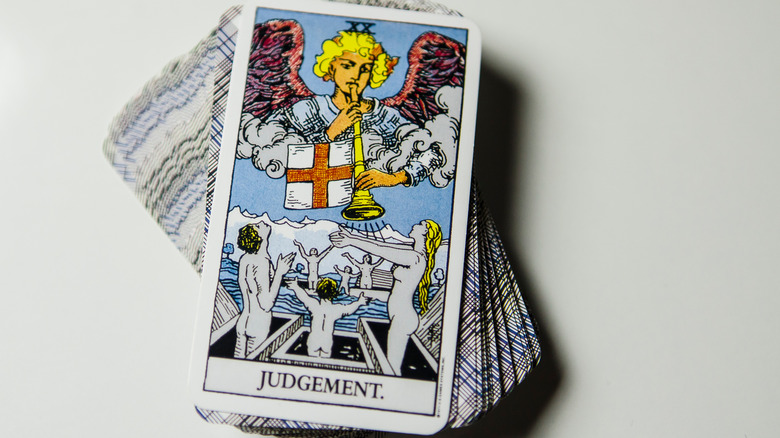The Judgement card, a striking and enigmatic element of the Tarot deck, evokes a multitude of interpretations and reflections. Often overlooked in favor of more flamboyant cards, it represents a crucial turning point in one’s personal narrative. This card resonates with individuals embarking on significant life transitions, resonating universally with those facing critical decisions. Yet, it is not merely its implications in decision-making that captivate enthusiasts; it delves deeper into themes of rebirth, accountability, and self-discovery.
Visually, the Judgement card is compelling. It usually depicts a figure—often a celebratory angel—trumpeting from the heavens, reminiscent of a clarion call echoing through one’s consciousness. Beneath this celestial being, individuals rise from what appears to be a grave, symbolizing resurrection and the dawning of a new life. The heralding angel signifies awakening, transformation, and judgment. This imagery encapsulates a contrast that intrigues many: the delicate dance between the finality of death and the infinite possibilities that arise from it.
At its core, the Judgement card embodies the essence of self-evaluation. It implores individuals to reflect on their past actions and choices, spotlighting the necessity of introspection. One might observe a powerful urge in the human experience to seek validation, to assess whether one’s life trajectory aligns with personal values and aspirations. Judgement encourages this essential reckoning; it serves as a reminder that self-awareness is pivotal for growth.
This card often manifests during moments of crisis or pivotal transformation. As a conduit for change, it suggests the potential for profound regeneration; akin to a phoenix rising from the ashes. It symbolizes the shedding of old skins, urging a metamorphosis that enables individuals to embrace new beginnings. Interestingly, this theme of renewal resonates with various life situations—be it career changes, ending toxic relationships, or spiritual awakenings. The importance of facing consequences and lessons learned is directly tied to the emergence of better versions of ourselves.
In a practical sense, the Judgement card signifies accountability. It invites individuals to take stock of their morality and ethical standings. In a world fraught with ambiguity, the card encourages one to communicate openly and embrace transparency. This call for honesty extends not only to relationships with others but also towards oneself. It poses challenging yet requisite queries: Have you lived authentically? Have your actions reflected your true self? The card thus serves as a mirror, reflecting our deepest truths and prompting transformative acknowledgment.
However, the allure of the Judgement card extends beyond mere self-analysis. It encapsulates the concept of universal justice—indicating that our actions, good or bad, ultimately yield consequences. The card suggests that life’s cyclical nature ensures that every deed finds its day of reckoning. This notion resonates deeply in a society often grappling with ethical dilemmas and moral conflicts. The Judgement card’s implication of cosmic balance provides solace to those seeking justice and reassurance that integrity pays off in the long run.
A common observation surrounding the Judgement card is its manifestation during significant crossroads. When the card emerges in a reading, it often heralds the conclusion of a chapter, posing the question: “What lies ahead?” Such moments are ripe for reevaluation, prompting seekers to consider both their past and their desires for the future. Nevertheless, the transition suggested by the Judgement card is not solely about moving on; it involves a deeper recognition of the lessons imbued within past experiences.
The fascination with the Judgement card can also be traced to its spiritual dimension. It invokes themes of enlightenment and awakening, representing the quest for higher consciousness. This insight transcends mere decision-making, tapping into profound spiritual and existential inquiries. Many find themselves drawn to the teachings of this card in search of grace, clarity, and understanding on their journey through life’s labyrinth.
The card’s resonance with the concept of rebirth fosters a curiosity about what lies beyond our conventional existence. The possibility of being reborn—with fresh insights, enhanced perspectives, and renewed vigor—sparks a fire of hope and desire for progress. The notion that individuals can evolve, regardless of their past, is a universally captivating theme that underlines the redemptive aspect of the Judgement card.
In light of these multifaceted interpretations, the Judgement card stands as a beacon of self-reflection and transformation. It invites individuals to ponder their paths, prompting a reevaluation of choices and consequences. The emphasis on awakening and accountability encourages deeper connections with self and others. Enthusiasts of Tarot often find themselves enchanted by the card’s promise of renewal, the allure of justice, and the transformative potential embedded within its symbolism.
Ultimately, the enigmatic allure of the Judgement card lies in its capacity to resonate with the universal human experience—the perpetual struggle for meaning, the quest for redemption, and the innate desire to evolve. It asserts that each individual is capable of harnessing the power of their past, embracing their present, and sculpting their future. The journey signified by the Judgement card is emblematic of life itself: a path woven with choices, challenges, and the ultimate pursuit of self-understanding and authenticity.







Leave a Comment